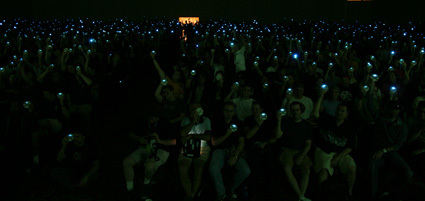Defcon 2006: The man behind the Defcon badge
Las Vegas (NV) - This year's Defcon computer security convention had a high-tech badge for an equally high-tech crowd. The circular badge was a colored circuit board complete with a small computer chip, battery and two blinking LED lights. Defcon staff wanted the badge to be difficult to counterfeit, but easy enough to add some interesting hacks.
A small push-button switch on the back of the back controlled the flashing blue LEDs. Joe Grand, the creator of this year's Defcon badge, told us that the first press would turn on both LEDs, while a second press would flash both lights. The third press would make the lights alternate and the fourth was set up to run a "pseudo random" sequence. Some attendees tried to decode the pattern, thinking it was some secret message, but Grand said, "I ended up bursting their bubble... when I told them it was indeed pseudo random."
It's become a tradition at Defcon to counterfeit the badge, both to get in for free and to prove a point - this is a hacker convention after all. Grand and other Defcon staff realized that it's virtually impossible to completely prevent counterfeiting, so they made the badge cost prohibitive to copy. "Making an active circuit board that looks and functions the same will cost much more than the $100 to get into Defcon," said Grand.
But while Grand wanted to make the badge tough to counterfeit, he also wanted attendees to come up with most outlandish hack or modification. During the convention, we often saw attendees with their soldering irons out trying to affix LED lights or rip off the processor. During the closing ceremonies, the two best hacks were shown off. One attendee turned the two LED lights into a flame-thrower and another converted the LED light flashes into sound output.
Also during closing ceremonies, Grand turned off the convention hall lights and had all the attendees switch on the badges. The resulting eerie bluish-green glow from the LED lights was quite a sight to photograph.
Download: TG Daily Audio Interview with Joe Grand. Running time: 9:33 min, variable bit rate MP3
Get Tom's Hardware's best news and in-depth reviews, straight to your inbox.
Humphrey Cheung was a senior editor at Tom's Hardware, covering a range of topics on computing and consumer electronics. You can find more of his work in many major publications, including CNN and FOX, to name a few.

